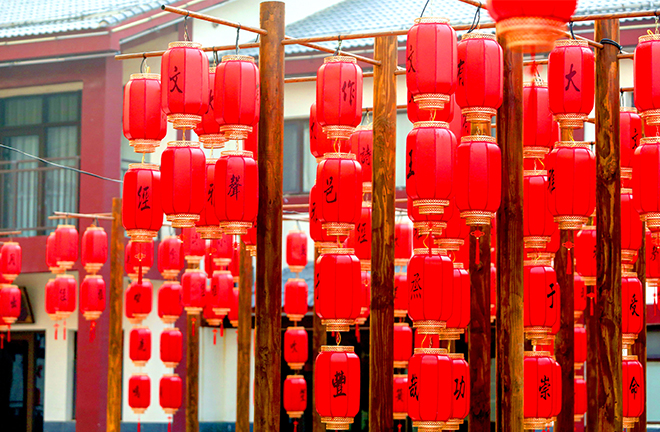Forum illuminates translation of Chinese classics

Lanterns written with quotations from classical poems are hung to celebrate the Chinese Spring Festival at Mao Sui Park in Handan, Hebei Province, on Jan. 3. Photo: CFP
The National Classics Translation Summit Forum 2022 was held via video link recently by the School of Foreign Languages at Northeast Normal University.
Transknowletology
In the digital age, translation plays an increasingly prominent intermediary role in knowledge transfer, cultural renewal and social changes, propelling the emergence of knowledge translation studies, or “transknowletology,” which proceeds from the understanding, transfer, and dissemination of knowledge to reconstruct the localness of knowledge and the universality of translation.
Chinese classics constitute an integral part of the world knowledge system. Placing the translation of Chinese classics within the vision of transknowletology and systematically classifying and planning the works according to natural sciences, social sciences, and the humanities has far-reaching academic significance and cultural value for understanding and spreading Chinese knowledge and promoting the worldwide interpretation of Chinese culture.
The translation of Chinese classics into other languages began 400 years ago with the spread of Chinese culture by missionaries and sinologists. In the 1990s, the Library of Chinese Classics, a translation project of Chinese classics, was launched, formally granting these activities the nature of national translation. At present, the field has become a pillar of Chinese academics and a torrent for Chinese culture to “go global.”
According to Wang Kefei, a professor with Beijing Foreign Studies University, pooling translated classics into a general catalogue will facilitate a comprehensive understanding of Chinese culture across the world. This catalogue should include not only Chinese classics, ethnic classics, and local culture, but also compile domestic and overseas translations, introductions, and research.
Translation strategies should be adapted to linguistic and regional differences, and employ styles and types suited for diverse audiences, Wang continued. Additionally, efforts are necessary to classify scattered and uncategorized translated pieces by translators, ages, languages, categories, etc., to create a large-scale searchable database of translated classic literature.
“Under the theory of transknowletology, translation has turned into an issue concerning the global identity of local knowledge,” said Yang Feng, a professor from the School of Foreign Languages at Shanghai Jiao Tong University. Local knowledge presents its universal characteristics of variability, association, and interconnectivity by means of the translation process. The subjective defense and understanding, competition and use, as well as dissemination and influence of various kinds of local knowledge essentially mark the degree of identification with local knowledge in the world.
Theoretical innovation
As the linguistic structure and expression habits of classics are disparate from modern vernacular, it is a great challenge for translators to understand original texts and translate them into the target language. Accordingly, the exploration of translation methods and theories is a key topic in the study of classics translation. At present, the theoretical explanations most applicable to the translation of Chinese classics are functional structuralism and deconstructionism.
“In the 1990s, the introduction of deconstructionist translation thought into China has had a profound impact,” said Zhang Zhizhong, a professor from the College of Foreign Languages at Nankai University. Deconstructionism overturns the traditional views of translation and solves the untranslatability of poetry. It endows translators with more autonomy and advocates fully leveraging their subjective initiatives with the original text, thus broadening their vision and infusing their own personality. Deconstructionism provides new perspectives and new methods for translating classics, making the activity more flexible and creative. It not only elevates the quality and level of English translations of Chinese poems, but also serves as salutary theoretical references for Chinese poetry to “go global.”
Chen Daliang, a professor from the School of Foreign Languages at Soochow University, pointed out that translation of classical books must overcome the obstacles of comprehending ancient Chinese, and draw on various annotations, variorums, and interpretations to acquire objective knowledge, rational understanding, and legitimate interpretation. At the same time, “distance” is not always disadvantageous; it can serve as a useful analytical tool. For example, spatial-temporal distances are useful when reviewing the origins and development of classics and identifying sequential research. It can also transpose time and space to multi-dimensional, multi-modal translation modes.
Zhou Guijun, dean of the School of Foreign Languages at Northeast Normal University, illustrated the influence of cultural translation strategies on communication effects with the English version of Lao Tzu’s Laws Divine and Human, or Tao Te Ching by Xu Yuanchong. The translation of this classic began in the 16th century, and the transmission subjects of its English translation were mainly composed of three groups: British sinologists who were missionaries or diplomats in the 19th century; British and American sinologists and translators, and Western translators from other professions since the 20th century; Chinese translators including domestic and overseas Chinese. The communication effect refers to changes in the psychology, behavior, and other aspects of the audience after receiving the information, and is an important criterion by which to evaluate communication activities. Xu adopted the translation strategy of domestication as the primary method and foreignization as auxiliaries. The combination of multiple translation methods not only preserves the cultural characteristics of the source language to the greatest extent, but also disseminates Lao Tzu’s thoughts to modern Western readers as accurately as possible.
Edited by YANG LANLAN
